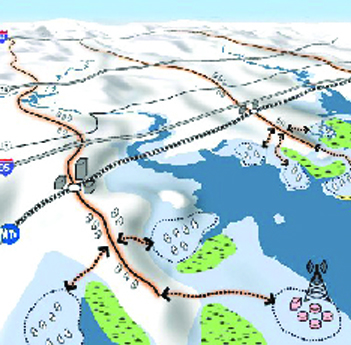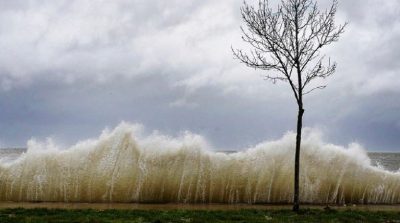State Agencies Fostering Resilience (SAFR) Council

Origin
On October 29, 2015 former Governor Malloy announced an executive order making permanent a working group - comprised of state agency heads and experts - that is responsible for strengthening the state's resiliency from extreme weather events, including tropical storms, hurricanes, storm surges, flooding, ice storms, extreme high winds, extreme heat, and slow onset events such as sea level rise.
"We have transformed the way we respond to emergencies over the past several years. We are now more prepared to respond to an extreme weather event than we ever have before. The current working group we have among our state agencies has improved communication and planning while maximizing state resources. By making this group permanent, we can ensure that a formal, structured body exists to respond quickly and efficiently in the future in order to protect critical infrastructure systems," Governor Malloy said.
Created under Governor Malloy's Executive Order No. 50, the State Agencies Fostering Resilience Council ("SAFR Council") will be responsible for working to create a Statewide Resilience Roadmap based on the best climate impact research and data and assisting the state Office of Policy and Management in the creation of a state policy on disaster resilience. The organization of SAFR changed in 2019 under a new gubernatorial administration. Governor New Lamont's Executive Order No. 3 identified the SAFR Council as a subcommittee of the Governor's Council on Climate Change (GC3).
Governor Malloy's Executive Order No. 50 charged the SAFR Council with the following scope of work:
- Collaborate on the creation of a Statewide Resilience Roadmap based on the best climate impact research and data including extensive research studies that inform land use patterns;
- Assist the Office of Policy and Management (OPM) in the creation of state policy on Disaster Resilience by using science based, forward looking risk analysis;
- Coordinate with National Incident Management System (NIMS) informed recovery plans and protocols;
- Ensure that information developed as part of subsections (a) and (b) is incorporated into the planning processes of SAFR Council member agencies, including but not limited to the State Plan of Conservation and Development, State Natural Hazard Mitigation Plan and the Comprehensive Energy Strategy;
- Support municipalities in incorporating the same information into their coastal resilience plans and local plans of Conservation and Development; and
- Coordinate with the Long Term Recovery Committee and the GC3 to implement a holistic approach to adaptation, resilience and recovery.
Two goals of SAFR include:
- Consultation on CIRCA's Resilient Connecticut project and extensive stakeholder engagement.
- Inform the development of a Resilience Planning Framework. Work will involve a focus on neighborhood, town, and regional scales and will consider the vulnerability of all infrastructure systems with the goal of developing multi-scale strategies for resilience.
Coordination with CIRCA
CIRCA’s partnership with state agencies took a new focus with the start of the Resilient Connecticut project. Agencies, who had been identified members on the SAFR Council, are now involved in oversight of Resilient Connecticut and meet once a month with the CIRCA team. This allows CIRCA to continue helping meet the needs of state agencies as they identify their risk and vulnerabilities to climate change. Outcomes of these partnerships in past have included:
- Collaboration with the Department of Public Health on assessing the vulnerability of drinking water systems and developing plans to address those vulnerabilities.
- Partnering with SCRCOG on flooding along Rt. 146 with funding provided to SCRCOG from the CT DOT.
- Meetings with state agencies and legislators on SB7 and (Public Act 18-82) “An Act Concerning Climate Change and Resilience”
SAFR in the News
- Hartford Courant, Malloy Creates Group To Tackle Storm Preparedness
- Connecticut Fund for the Environment, Gov. Lamont’s executive order on climate & resiliency
- New Haven Register, Connecticut establishing extreme weather task force
- Federal Register, The Daily Journal of the US Government, Notice of Intent To Prepare an Environmental Impact Statement (EIS) for the Resilient Bridgeport: National Disaster Resilience and Rebuild by Design Projects in the City of Bridgeport, Connecticut
- The CT Mirror, Connecticut’s vanishing shoreline: One storm away from disaster
